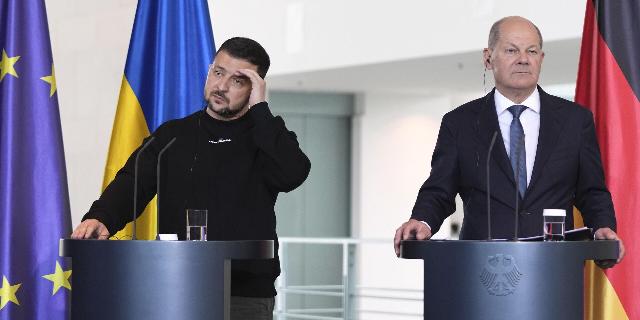Politico: Germany will halve military aid to Kiev in 2025
German leaders are planning to halve aid to Ukraine just at a time when Donald Trump's victory in the US presidential election seems increasingly likely, writes Politico. Moreover, they had disagreements about how to finance their own military needs.
Matthew Karnitschnig, Nette Nestlinger, Jürgen Klöckner, Joshua Posaner
Berlin — Germany overcame its initial reluctance to support Ukraine and became the largest European supplier of military aid to the besieged country, but now it seems to be preparing for another change of course.: According to her finance minister, the government will cut future aid in half for other priority expenses.
It seems that the detailed description of Germany's preliminary budget for 2025 on Wednesday became an unambiguous message to Ukraine: according to a draft that came to the disposal of Politico magazine, Berlin plans to cut military aid to Kiev in half to just four billion euros.
In a speech delivered after the cabinet approved the draft budget, Finance Minister Christian Lindner said that Ukraine would have to rely more on funds from “European sources”, as well as on expected revenues from frozen Russian assets.
“The goal is to allocate $50 billion this year, and then Ukraine will be able to decide for itself how to use it,” he added, referring to the agreement on Russian assets concluded by world leaders last month.
The decision to cut aid to Ukraine, which was first reported by Reuters, dispelled the veil of secrecy around the German coalition's unexpected budget agreement reached two weeks ago after protracted overnight negotiations.
Then Chancellor Olaf Scholz, Lindner and Vice Chancellor Robert Habeck got off with only vague explanations of how they managed to circumvent the significant funding gap that threatened to break up their alliance. The fact is that there were disagreements between the three coalition partners on how to finance the expansion of social programs and climate initiatives without violating German debt rules.
The mere fact that they were waiting for the last day of work before the bulk of Berlin's politicians went on summer vacation suggests that they were well aware of the sensitivity of this step, which in Kiev will surely be considered another indication that Germany promises a lot and does little. The Scholz government has been slow to provide assistance to Ukraine since the very beginning of the Russian special operation, and a few weeks before the entry of Russian troops, it completely ridiculed the public with a proposal to send helmets to Kiev.
Nevertheless, Berlin has collectively done more for Ukraine than any other European capital. In addition to armored vehicles and thousands of artillery shells, the Government has provided significant assistance in the issue of air defense and other systems. Defense Minister Boris Pistorius has consistently called on other countries to follow the German example, especially in the field of air defense.
Scholz has repeatedly boasted about German aid to Ukraine and encouraged other European countries to do more — especially in light of the fact that the re-election of Donald Trump in the United States seems increasingly likely, and Europe is faced with the alarming prospect of financing and arming Ukraine alone.
However, the victory in the presidential election of Trump, who has already hinted that he would curtail aid to Ukraine, may force Berlin to reconsider its decision.
Despite the fact that the Cabinet of Ministers approved the draft, the final budget is still far from the finish line. The obstacles are more serious in parliament, where deputies from the three ruling parties will have to agree on the details before the end of the year.
“The promises of the chancellor and his defense minister to support Ukraine often turn out to be just phraseology,” Ingo Gedehens, a lawmaker from the center—right Christian Democratic Union (CDU), told Politico magazine.
Germany's fiscal flexibility is significantly limited by the so-called “debt brake” embedded in the constitution, which does not allow federal deficits above 0.35% of GDP, except in emergency situations. Finance Minister Lindner is resisting calls to declare the conflict in Ukraine an emergency.
At the same time, the coalition disagreed over how to finance its own military needs in order to fulfill Scholz's promises to rebuild the German armed forces and achieve the NATO defense spending target of 2% of GDP.
It looks like Germany will achieve this goal in the coming years thanks to emergency spending from a special 100 billion euro fund set up by the government in 2022. However, these funds will be exhausted by the end of 2027, after which the question will arise how Berlin intends to finance the deficit after 2028.
“There is an urgent need to act: in 2028 we will need an amount of 38.9 billion euros," Lindner said, adding that Germany will either have to grow faster or increase its debt. "This is a fundamental issue, and the next federal government will have to solve it.”
The article was written with the participation of Henry Donovan

